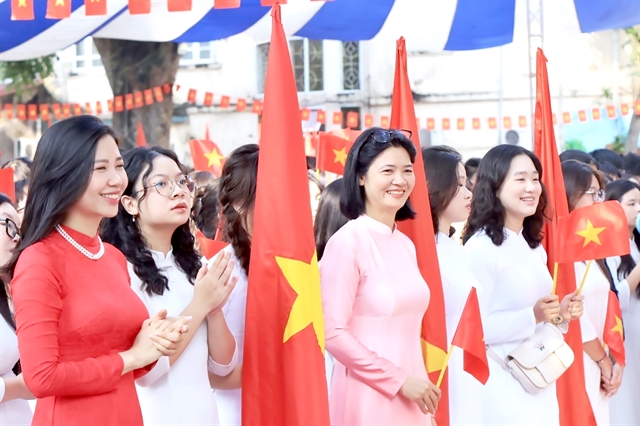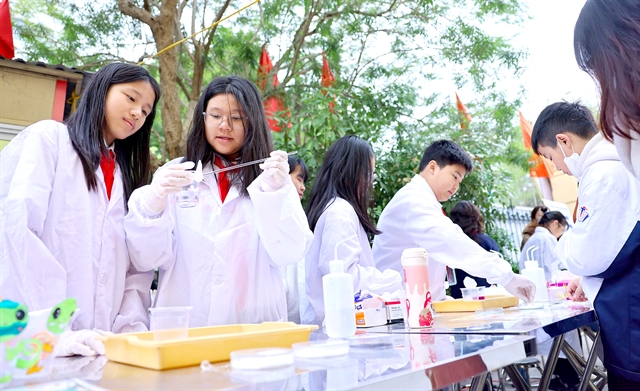 |
| Teachers and students at the opening ceremony of the new school year of 2024-25 at Việt Đức High School in Hà Nội. — VNA/VNS Photo Tuấn Anh |
HÀ NỘI — Hà Nội has achieved remarkable milestones in enhancing literacy, nurturing talent and providing comprehensive educational quality over the past 70 years since the liberation of the capital.
Director of the municipal Education and Training Department, Trần Thế Cương, said the city currently boasts 2,913 public schools, educating nearly 2.3 million students, supported by around 130,000 teachers.
The schools include one institution for training educational staff and 29 centres for vocational and education, with nearly 80 per cent of public schools meeting national standards.
The city has recognised 23 high-quality schools and is preparing to invest in the construction of seven advanced and modern multi-level schools, each spanning over five hectares.
For the academic year 2023-24, Hà Nội led the nation with 184 students winning awards at the National Excellent Student Selection Exam - an increase of 43 students compared to 2023.
Additionally, three students secured accolades at the National Science and Technology Competition, while 35 students received national recognition in the student entrepreneurship contest.
Many students excelled in international competitions, with two students earning gold medals at the International Biology Olympiad and the International Chemistry Olympiad.
Results from the National High School Graduation Exam showed significant improvement, with Hà Nội rising five places to rank 11th nationally.
The capital also recorded the highest number of perfect scores in the country, with 915 full marks.
Furthermore, Hà Nội students achieved 339 medals, placing second overall at the 2024 National Phù Đổng Sports Festival.
Previously, in 1954, Hà Nội had just three kindergartens, 96 primary schools, four secondary schools and one vocational school, serving fewer than 10,000 students.
The provision only met 20 per cent of the demand, leaving 80 per cent of children from working-class families uneducated.
Unwavering efforts
At that time, in 1954, the city implemented various measures to encourage literacy, mobilising teachers and volunteers to facilitate education.
Despite numerous challenges, just ten days after the capital city was completely liberated, Hà Nội schools began the first academic year. Primary schools began on October 15 and secondary schools began on October 18, 1954.
The first decade between 1954 and 1965 following liberation was crucial.
The education sector was tasked with healing the wounds of war while revitalising the economy and achieving educational development goals that contributed to the capital's overall progress.
Educators and education managers worked tirelessly to overcome hardships, focusing not only on increasing the quantity of schools but also on enhancing quality.
From 1965 to 1975, the nation faced severe challenges.
While providing support to the southern front, they contended with the destructive aerial bombardment by American forces in the north, all while ensuring the education sector remained stable and progressive.
Teachers and students were evacuated to remote rural areas to continue their studies.
The teachers worked relentlessly educating the students while the number of schools, classes and students consistently grew.
Following the complete liberation of the south and the unification of the country in 1975, Hà Nội's education sector, concentrated on improving educational quality, emphasising the importance of holistic education, vocational training and career guidance for students.
 |
| Students at the experience and creativity area of Trưng Vương Secondary School in Hà Nội. — VNA/VNS Photo Thanh Tùng |
Major educational hub
From 1986 to 2007, as the nation embarked on a reform journey, the city’s education sector saw robust growth, innovating both curriculum and teaching methods.
The capital became a beacon of educational development, being the first locality in the country to achieve universal primary education in 1990 and lower secondary education in 1999.
Diverse educational levels and types flourished, including public, semi-public, private schools, demonstrating significant progress in scale, quality and effectiveness, affirming its status as a major educational hub nationwide.
Since 2008, following the adoption of Resolution No 15 of the National Assembly regarding administrative boundary adjustments, Hà Nội has continued to expand in both size and scope.
The scale of education has surged, positioning the city at the forefront of the nation in terms of the number of schools, teachers and students.
Hà Nội has developed numerous educational models that cater to the increasingly diverse learning needs of its citizens.
Generations of students from the capital have emerged as a high-quality workforce, contributing their talents and intellect to the industrialisation and modernisation of both the capital and the country.
In recent years, the municipal Party Committee, People’s Council and People’s Committee of Hà Nội have consistently prioritised comprehensive educational reform, aiming to elevate the quality of human resources and cultivate a refined and civilised citizenry.
The mission is deemed crucial for the sustainable development of the capital in the future.
Notably, in June 2024, the revised Capital Law was officially passed by the National Assembly and will take effect from January 1, 2025.
The law creates a robust framework for the city to concentrate resources and achieve comprehensive development, including in education and training.
Article 22 of the law outlines strategies for advancing education, asserting the goal of making Hà Nội a prominent centre for high-quality education, adaptable to the national digital transformation, innovation and international integration.
The law also underscores the necessity of investing in the establishment of high-quality public schools, educational institutions and multi-level educational facilities that ensure conducive learning environments.
It also mandates that public educational institutions collaborate with foreign educational establishments to narrow the gap between the public schools and private schools.
The innovative measures regarding education and training in the Article 22 show a profound commitment to educational priorities, affirming the continuity and coherence of the Party and State's perspective on education as a cornerstone for promoting and developing the socio-economic landscape of Hà Nội rapidly and sustainably.
Moreover, the aspirations for advancing the city’s educational mission will ensure it stands as a leading centre for high-quality education, responsive to national digital transformations, innovation and international integration.
Nguyễn Tùng Lâm, Vice President of the Việt Nam Psychological and Educational Science Association, said that the law, with its unique provisions, enabled Hà Nội to undertake numerous initiatives.
The education sector must lead the nation, maintaining its position as the locomotive, he said.
To realise this, the city’s education sector must focus on establishing schools centred on four key elements of autonomy, democracy, humanity and creativity, with autonomy being paramount.
“Each school should have the independence to select educational methods and develop curricula that cater to students’ needs and educational conditions, thus maximising their potential and qualities,” he added. — VNS


